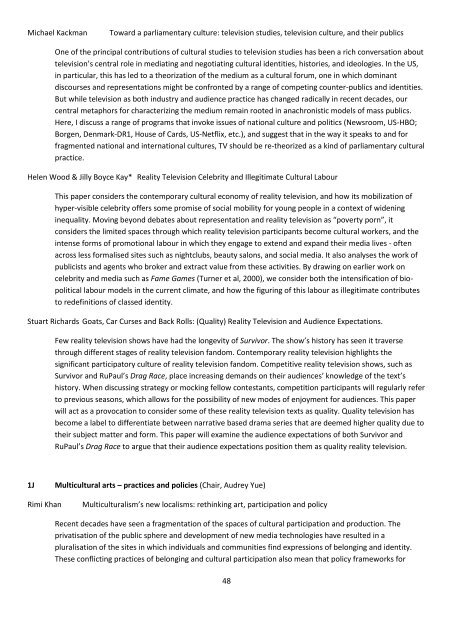Crossroads in Cultural Studies Conference 14-17th December 2016 Program Index
Crossroads-2016-final-draft-program-30-Nov
Crossroads-2016-final-draft-program-30-Nov
You also want an ePaper? Increase the reach of your titles
YUMPU automatically turns print PDFs into web optimized ePapers that Google loves.
Michael Kackman<br />
Toward a parliamentary culture: television studies, television culture, and their publics<br />
One of the pr<strong>in</strong>cipal contributions of cultural studies to television studies has been a rich conversation about<br />
television’s central role <strong>in</strong> mediat<strong>in</strong>g and negotiat<strong>in</strong>g cultural identities, histories, and ideologies. In the US,<br />
<strong>in</strong> particular, this has led to a theorization of the medium as a cultural forum, one <strong>in</strong> which dom<strong>in</strong>ant<br />
discourses and representations might be confronted by a range of compet<strong>in</strong>g counter-publics and identities.<br />
But while television as both <strong>in</strong>dustry and audience practice has changed radically <strong>in</strong> recent decades, our<br />
central metaphors for characteriz<strong>in</strong>g the medium rema<strong>in</strong> rooted <strong>in</strong> anachronistic models of mass publics.<br />
Here, I discuss a range of programs that <strong>in</strong>voke issues of national culture and politics (Newsroom, US-HBO;<br />
Borgen, Denmark-DR1, House of Cards, US-Netflix, etc.), and suggest that <strong>in</strong> the way it speaks to and for<br />
fragmented national and <strong>in</strong>ternational cultures, TV should be re-theorized as a k<strong>in</strong>d of parliamentary cultural<br />
practice.<br />
Helen Wood & Jilly Boyce Kay* Reality Television Celebrity and Illegitimate <strong>Cultural</strong> Labour<br />
This paper considers the contemporary cultural economy of reality television, and how its mobilization of<br />
hyper-visible celebrity offers some promise of social mobility for young people <strong>in</strong> a context of widen<strong>in</strong>g<br />
<strong>in</strong>equality. Mov<strong>in</strong>g beyond debates about representation and reality television as “poverty porn”, it<br />
considers the limited spaces through which reality television participants become cultural workers, and the<br />
<strong>in</strong>tense forms of promotional labour <strong>in</strong> which they engage to extend and expand their media lives - often<br />
across less formalised sites such as nightclubs, beauty salons, and social media. It also analyses the work of<br />
publicists and agents who broker and extract value from these activities. By draw<strong>in</strong>g on earlier work on<br />
celebrity and media such as Fame Games (Turner et al, 2000), we consider both the <strong>in</strong>tensification of biopolitical<br />
labour models <strong>in</strong> the current climate, and how the figur<strong>in</strong>g of this labour as illegitimate contributes<br />
to redef<strong>in</strong>itions of classed identity.<br />
Stuart Richards Goats, Car Curses and Back Rolls: (Quality) Reality Television and Audience Expectations.<br />
Few reality television shows have had the longevity of Survivor. The show’s history has seen it traverse<br />
through different stages of reality television fandom. Contemporary reality television highlights the<br />
significant participatory culture of reality television fandom. Competitive reality television shows, such as<br />
Survivor and RuPaul’s Drag Race, place <strong>in</strong>creas<strong>in</strong>g demands on their audiences’ knowledge of the text’s<br />
history. When discuss<strong>in</strong>g strategy or mock<strong>in</strong>g fellow contestants, competition participants will regularly refer<br />
to previous seasons, which allows for the possibility of new modes of enjoyment for audiences. This paper<br />
will act as a provocation to consider some of these reality television texts as quality. Quality television has<br />
become a label to differentiate between narrative based drama series that are deemed higher quality due to<br />
their subject matter and form. This paper will exam<strong>in</strong>e the audience expectations of both Survivor and<br />
RuPaul’s Drag Race to argue that their audience expectations position them as quality reality television.<br />
1J<br />
Multicultural arts – practices and policies (Chair, Audrey Yue)<br />
Rimi Khan<br />
Multiculturalism’s new localisms: reth<strong>in</strong>k<strong>in</strong>g art, participation and policy<br />
Recent decades have seen a fragmentation of the spaces of cultural participation and production. The<br />
privatisation of the public sphere and development of new media technologies have resulted <strong>in</strong> a<br />
pluralisation of the sites <strong>in</strong> which <strong>in</strong>dividuals and communities f<strong>in</strong>d expressions of belong<strong>in</strong>g and identity.<br />
These conflict<strong>in</strong>g practices of belong<strong>in</strong>g and cultural participation also mean that policy frameworks for<br />
48


